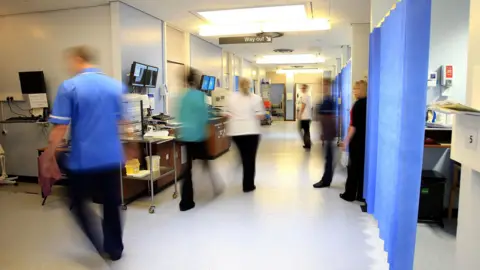NHS Scotland staff offered 8% pay rise over two years
 PA Media
PA MediaNurses, midwives and healthcare staff across Scotland have been offered an 8% pay increase over two years.
Health Secretary Neil Gray set out plans for a 4.25% increase in 2025-26 and a 3.75% rise next year.
The offer - which the government said would cost around £701m - will also be protected by an "inflation guarantee", meaning pay increases will always be at least 1% above the Consumer Price Index (CPI) rate.
The Scottish offer is significantly higher than the 2.8% increase recommended by the UK government and raises questions about wider NHS pay.
It could also mean Holyrood ministers having to find the extra funding from elsewhere in their budget.
Unison said it would consult its members on the Scottish government proposal with a digital ballot while the Royal College of Nursing (RCN) Scotland said its board was considering the offer "in detail".
GMB Scotland, one of the biggest unions in NHS Scotland, and the Scottish Ambulance Service will also ballot members on the pay offer.
 PA Media
PA MediaNeil Gray described the deal as "strong", saying it had come as a result of "constructive" talks with unions.
He said: "It is guaranteed to remain above CPI inflation, which gives added reassurance to staff, and will ensure Scotland's nurses, midwives and NHS staff have the best pay in the UK.
"I want to express my thanks again to Scotland's hardworking healthcare staff for their continued hard work and commitment."
Wes Streeting, health secretary in the UK government, told BBC News the 2.8% figure had been put into the pay review process, but that no final decision had yet been reached.
He said: "The pay review body looks at that and a range of other factors, and then makes recommendations and obviously we've seen all sorts of changes in terms of the economic backdrop since then.
"So we'll wait to see those recommendations. I'm just asking staff to kind of bear with us."
A Unison spokesperson said the idea that only 2.8% was affordable for NHS workers in the rest of the UK was "ludicrous".
The Royal College of Nursing has called for a "significant pay rise" and accused UK ministers of "dither and delay".
Living costs
Unison's co-lead for health in Scotland Matt Mclaughlin said: "The government has said that this is its final offer.
"The union's health committee will now take soundings from NHS staff and then meet to discuss next steps."
He added that the union would put the offer to its members in a consultative ballot "as soon as that can be arranged".
(RCN) Scotland director Colin Poolman said: "Our pay claim, submitted in January, called for an offer that reflects increases in living costs and begins to address the historic erosion of pay.
"RCN Scotland board members are considering the Scottish government's offer in detail."
Claire Ronald, the senior negotiating officer in Scotland for the Chartered Society of Physiotherapists, said the deal was "the best that can be achieved", adding it would now consult members.

Scotland is the first part of the UK to make a pay offer to staff with unions directly involved in negotiations with the Scottish government.
It affects around 170,000 NHS staff who are already paid higher salaries than in other nations. The current starting salary for a newly-qualified Band 5 nurse is just under £32,000 compared to around £30,000 in England and Wales. Doctors' pay is negotiated separately.
Staff costs make up almost 60% of the health budget and clearly the government sees above-inflation pay offers as a way to address long-running recruitment and retention issues.
The gamble here is that it doesn't know what deal will be offered to NHS staff elsewhere in the UK as negotiations are ongoing. However, the UK government has so far said it would recommend a 2.8% increase, a move described as "offensive" by unions.
If the pay deal is significantly higher for Scotland, the government will have to find the money to pay for it with no additional money coming from Westminster.
That could lead to cuts in services or scaling back recruitment to meet the cost of salary increases.
Last year, the Scottish government was forced to make emergency cuts of £500m partly because of public sector pay deals.
